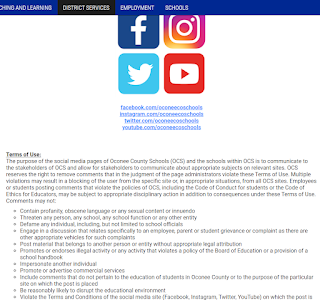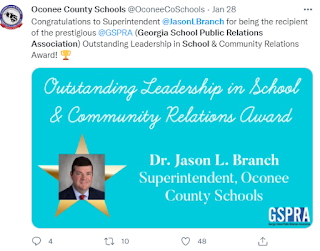The staff of the First Amendment Clinic at the University of Georgia School of Law has asked Oconee County Schools to remove or modify a restriction contained in its Social Media Terms of Use put into place before the beginning of the current school year.
Those Terms of Use prohibit persons from commenting on the social media sites maintained by Oconee County Schools if the comment, in the view of the school staff, "relates specifically to an employee, parent or student grievance or complaint."
Prohibiting discussion of complaints and grievances on the Oconee County Schools' social media accounts is not a reasonable restriction in light of the stated purpose of the forum, the legal team wrote in a letter to the lawyer for Oconee County Schools.
The prohibition is an "unconstitutional speech restriction," the Law School legal team wrote, and would likely be held unconstitutional on First Amendment grounds were it challenged in court.
Phillip L. Hartley, from the Gainesville law firm that represents Oconee County Schools, rejected the arguments of the clinic in an email message on Aug. 9, saying the staff members of the First Amendment Clinic "misinterpret" the restriction in the Terms of Use.
Clare Norins, director of the First Amendment Clinic, said on Wednesday that no one from Harben, Hartley and Hawkins has responded to a second letter that she and her colleagues sent on Nov. 8, again asking Oconee County Schools to "remove or significantly revise" the prohibition in its Terms of Use.
Terms Of Use
On June 19, Hartley sent Norins and Samantha Chariz Hamilton, a senior legal fellow in the First Amendment Clinic, an email saying "Below you will find the revised Terms of Use to be used on the Oconee County School District social media sites.
 |
| Screen Shot Social Media Terms Of Use OCS |
"It was a pleasure working with your Clinic and everyone involved," the email continued.
What followed was the Social Media Terms of Use that now appear on the Oconee County Schools web site.
"The purpose of the social media pages of the Oconee County Schools (OCS) and the schools within the District is to communicate to the stakeholders of the District and allow for stakeholders to communicate about appropriate subjects on relevant sites," according to the statement.
"OCS reserves the right to remove comments that in the judgment of the page administrators violate these Terms of Use," it continues.
"Multiple violations may result in a blocking of the user from the specific site or, in appropriate situations, from all OCS sites," the statement reads.
"Employees or students posting comments that violate the policies of the District, including the Code of Conduct for students or the Code of Ethics for Educators, may be subject to appropriate disciplinary action in addition to consequences under these Terms of Use," according to the statement.
The statement lists 14 types of prohibited comments, including those that "Engage in a discussion that relates specifically to an employee, parent or student grievance or complaint."
The page shows the icons for Facebook, Instagram, Twitter and YouTube and provides links to each of those social media sites.
Oconee County Schools makes extensive use of these sites, as well as of its own web page and email, for promotional materials about the schools and for information items about such things as the dates for when a parent can request a transfer of a student from an assigned school to another school and school holiday dates.
Origin Of Policy
On Aug. 28, Norins, Hamilton, and clinic interns Daniel Zimmer and Nirali Vyas, sent Hartley a response to the Terms of Agreement.
The four said that the Terms of Use "presents the same First Amendment concerns we had previously raised when OCS blocked a member of the public from its Twitter account after she posted content critical of OCS administration."
That was a reference to a letter of Feb. 5, when representatives of the First Amendment Clinic had written to Hartley with a number of concern, including one involving a Twitter post.
In Jan. 28, Oconee County Schools posted on Twitter that Oconee County Schools Superintendent Jason Branch was "the recipient of the prestigious @GSPRA (Georgia School Public Relations Association) Outstanding Leadership in School & Community Relations Award!"
Kendra Kline responded, according to a Feb. 5 letter from the First Amendment Clinic to Hartley, by posting "What'd he win it for? Being a malevolent, incompetent jerk with no regard for the health and safety of his staff, students, and community? Congrats!"
Kline subsequently received a message saying that she was "blocked from following @OconeeCoSchools and viewing @OconeeCoSchools's Tweets," according to that Feb. 5 letter.
The First Amendment Clinic wrote to Hartley in that Feb. 5 letter, objecting to the "retaliatory actions committed in violation of the First Amendment" when Oconee County Schools "blocked members of the community from the designated or limited public forum located on the OCS Twitter page."
Concern About Item
In its letter of Aug. 28 to Hartley, the legal team at the First Amendment Clinic focused exclusively on the fourth prohibition in the Terms Of Use.
That is the item that states that "Comments may not...Engage in a discussion that relates specifically to an employee, parent or student grievance or complaint as there are other appropriate vehicles for such complaints."
The team wrote that "the interactive spaces on OCS’s social media pages constitute limited public fora--i.e., government-created digital spaces where online users may express themselves on certain topics."
Based on case law, the legal team wrote, "In determining which topics may be discussed on its social media accounts, the District must be viewpoint neutral and the restrictions must be reasonable in light of the purpose of the fora."
"Courts particularly disfavor government restrictions on speech that elevate certain perspectives on a topic over others," they wrote.
"Therefore, under the First Amendment, a viewpoint-based restriction is disallowed in any government forum, whether public or not, except in the very rare circumstance where the restriction can satisfy strict scrutiny," they wrote.
"By singling out negative or critical speech, this term constitutes a viewpoint-based regulation," they argue.
Strict Scrutiny
According to the University of Georgia lawyers, "strict scrutiny requires that the speech restriction be narrowly tailored to serve a compelling government interest."
 |
| Twitter Post Oconee County Schools |
The "broad ban on discussion that relates specifically to an employee, parent or student grievance or complaint” is neither narrowly tailored nor serves a compelling government interest, they wrote.
"It is our understanding that because OCS does not monitor or respond to complaints raised on its social media accounts, OCS has an interest in preventing stakeholders from airing their grievances on these pages to save stakeholders from the mistaken belief that OCS will listen and respond," the Aug. 28 letter states.
"However, preventing such a mistaken belief is hardly a compelling interest," they write. "And even if it were, the current restriction on discussion of complaints and grievances is not narrowly tailored to serve it."
"Rather than run afoul of the First Amendment, we urge the District to remove from its social media Terms of Use the prohibition on discussion relating to 'an employee, parent or student grievance or complaint'," the letter states.
Hartley Response
In the Aug. 9 email, Hartley told Vyas, Norins, Zimmer, and Hamilton that "You and your colleagues misinterpret the meaning of the bullet to which you object."
The item is "not related to any viewpoint discrimination," he wrote. Rather it "is designed to be a content distinction between the purpose of the social media, which is to provide a forum to communicate about general school and school district issues, and purely individual issues.
A post related to a policy would meet the purpose of the OCS use of social media, Hartley said, "while a post related to an individual teacher’s evaluation, whether good or bad, would not be."
In their Nov. 8 response, Hamilton, Norins, and student attorney Paige Medley said that, even if we were to accept the premise that the restriction is content-based rather than viewpoint-based, "the term is still unlikely to withstand constitutional scrutiny for reasons of vagueness and unfettered discretion in implementation."
"The need for such intensive and nuanced line-drawing sets the stage for OCS administrators to exercise unbridled and arbitrary discretion in determining which grievances posted on OCS’s social media accounts are truly 'individual' and which relate to more general district issues," the three wrote.
"Affording this level of discretion to administrators allows them to engage in undetected viewpoint discrimination by regulating speech based on their like or dislike of the content or viewpoint of the grievances posted," they continue.
"We therefore once again urge OCS to remove or significantly revise this term," they write.
Board Involvement
The elected Board of Education has had no public involvement in creation of the Social Media Terms of Use.
The agendas and minutes of Board meetings before and after Hartley sent the Terms to the University of Georgia Law School team do not include discussion of the document.
A search of the Board and Oconee County Schools web page turns up only the web page with the listed Terms.
On July 19, the Board did pass a related policy statement saying that "citizens are invited to address the Board at appropriate times and in accordance with procedures established by the Board or the Superintendent."
At the June 7 Board meeting, Anisa Sullivan Jimenez, director of Communications for Oconee County Schools, presented a draft of a proposed section of the Board Policy Manual dealing with "Public Participation in Board Meetings."
The minutes do not show any actual Board vote on that document, but the procedures contained in the document currently are used by the Board at its Regular meetings.
That document reduced the amount of time speakers have from five to three minutes and limited comments to "Oconee County residents or school system employees."
No comments:
Post a Comment